
Alphabet Asks for the Keys to the Market in Calls to Regulate AI
On January 20, 2020 Sundar Pichai, CEO of Alphabet, the parent company of Google, penned an editorial in the Financial Times saying, “there is no question in my mind that artificial intelligence needs to be regulated”. While not calling for specific proposals of regulation, the next day at a conference in Brussels he suggested a temporary ban on facial recognition – as the European Union has batted around – might be welcome. As a market leader in artificial intelligence, Alphabet is calling to the public to erect regulation that will stand in the way of smaller competitors looking to make a name in artificial intelligence.
For business, regulation must be considered as a cost. Compliance with regulation requires an investment that does not grow depending on how many units of a product are sold. So more specifically, compliance with regulation is a fixed cost. Alphabet sells seven digital products with more than 1 billion users. With that kind of scale, the per-unit cost of new regulation is almost negligible. However new market entrants must overcome that same fixed cost without the benefit of scale.
In May of 2018, a different regulation, the General Data Protection Regulation (GDPR) came into effect in the European Union. After that date, businesses were forced to obtain affirmative consent before collecting any personal data online. Let us consider GDPR as a specific example of the kinds of regulation Alphabet’s Pichai might be calling for. If we zoom into thinking about this change on a micro-level, a consumer, let’s call her Sadie, is considering downloading a new application to browse career opportunities. When Sadie considers giving affirmative consent to LinkedIn, where she is already a member and connected with a large network, the decision is relatively easy. While she does give up a level of privacy, she thinks about the extensive network of people she would miss out on if she opted to not give consent to the application.
Comparing this to a new application that she is considering downloading, let’s call it BlinkOut. BlinkOut already has a natural disadvantage, lacking the large user-base of LinkedIn. Coupling this natural disadvantage with a cost of convincing its user to give obtained consent for it to collect personal data, BlinkedOut must overcome an unfairly large obstacle to compete in the market for browsing career opportunities. Just as it did in our fake example with BlinkedOut, GDPR served to increase switching costs and bolster barriers to entry in countless markets, benefiting large incumbent firms and lessening competition.
When large companies such as Alphabet call for regulation to benefit the public, we must carefully weigh any benefit against the cost of new regulation on the competitive environment. Alphabet’s Google alone spent over $20 million in lobbying in 2018, the last year where data is available. Technology companies including Google, Microsoft, and Apple are increasing the amount they spend on lobbying year over year – much of that undoubtedly to benefit their business through the passing of new regulation. As we continue to allow these behemoth companies to influence and even purchase regulation, we are handing over the keys to a once-competitive market.